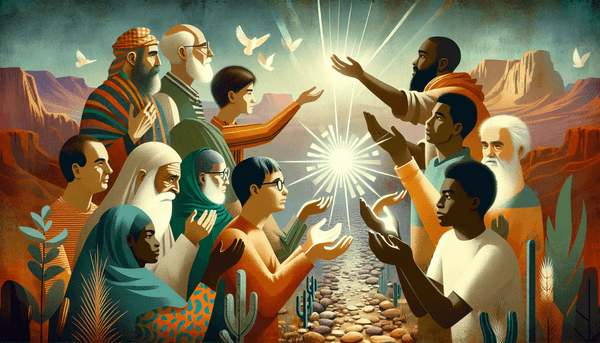Divine Sovereignty vs. Human Free Will
The intricate dance between divine predestination and human autonomy is a central theme of theological discourse. The Bible suggests a complex relationship between God's overarching plan and our individual decisions. In Revelation 3:20 we see a clear depiction of human agency, 'Behold, I stand at the door and knock. If anyone hears my voice and opens the door, I will come in to him and eat with him, and he with me.' This verse indicates that while God initiates the call, it is up to each person to respond, implying a choice to be made. Similarly, Deuteronomy 30:19 urges us to 'choose life,' while Joshua 24:15 presents a choice to 'serve the Lord.' These scriptures highlight the Bible's recognition of human free will, while also acknowledging God's sovereign power. The challenge for believers is to navigate this dynamic, understanding that while our choices have real impact, they ultimately fit within the divine narrative that God has authored.
Christian Guidance on Fear, Influence, and Relationships
The Bible offers profound guidance on navigating fear, the influences we allow into our lives, and the relationships we foster. In addressing fear, 2 Timothy 1:7 reminds us that 'God gave us a spirit not of fear but of power and love and self-control.' This powerful verse encourages believers to reject fear-mongering and to live with confidence in God's strength and love. Proverbs 13:20 advises us that 'whoever walks with the wise becomes wise, but the companion of fools will suffer harm,' suggesting the importance of surrounding ourselves with positive, godly influences. Furthermore, when considering relationships, especially marriages, the Apostle Paul counsels in 2 Corinthians 6:14 not to be 'unequally yoked with unbelievers,' highlighting the potential challenges in spiritual harmony within interfaith unions. For a deeper exploration of fostering meaningful connections and the essence of love and friendship as depicted in the Bible, read more at The Spiritual Tapestry of Love and Friendship. These scriptures collectively provide a roadmap for living a life anchored in faith, wisdom, and holy companionship.
FAQ
Q: Does the Bible say we have our own will, or is everything predestined by God?
A: The Bible indicates that humans have free will to make choices. For instance, Revelation 3:20 illustrates the concept of personal choice in responding to God's call.
Q: What does the Bible say about guardian angels?
A: The Bible portrays angels as ministering spirits who are sent to protect and serve those who belong to God (Hebrews 1:14).
Q: Are there specific prayers related to guardian angels in the Bible?
A: The Bible does not contain specific prayers to guardian angels, but it does acknowledge the role of angels in God's protection (Psalm 91:11-12).
Q: Can you provide a Bible verse where God talks about our free will?
A: Deuteronomy 30:19 is an example where God presents a choice, urging people to 'choose life' thereby acknowledging human free will.






